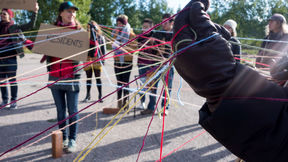Towards an eco-welfare state – how to direct the transition?
Interview with Mikko Jalas, Creative Sustainability Programme Director and Professor of Practice, about Towards Eco-Welfare State: Orchestrating for Systemic (ORSI) joint research project. Text by Tuulikki Peltonen.

We interviewed Mikko Jalas, Creative Sustainability Programme Director and Professor of Practice, about Towards Eco-Welfare State: Orchestrating for Systemic (ORSI) which is a joint research project between Tampere University, Finnish Environment Institute (Suomen ympäristökeskus, SYKE), VTT Technical Research Centre of Finland and Aalto University. The research is funded in 2019-2022/25 by The Strategic Research Council (SRC) at the Academy of Finland. The common research objective is analyzing the concept of eco-welfare state and developing policy and governance tools from the premise of a welfare state which highlights the justice and impartiality of societal transitions in Finland. The project is divided into four themes: public governance and budgeting for sustainability, fair transition in the everyday life of citizens, responsible innovation processes and steering of consumption choices. (See http://www.ecowelfare.fi for full information in Finnish).
Aalto University is focusing on the steering of consumer choices towards more sustainable consumption. In particular, the research work is oriented towards tools and digital environments such as carbon footprint calculators and personal carbon budgeting. In the development work, the fair division of consumer opportunities is stressed. Moreover, the research at Aalto University aims at supporting the system-level preconditions for changes in private consumption. Jalas, who is one of the research leaders in this work, tells that the research themes are directly visible for students through their application to the course Design for Government (DfG) and at least two Master’s Thesis projects. In Spring 2020, DfG students have an opportunity to work on the taxation of consumption. All in all, the research is made in networks connecting public and private organisations, media and the educational sector, Jalas explains, and continues that in the course context, the aim is to do genuine collaboration with the participating organisations by asking “how can we be of help” and working with the most relevant challenges.
The project is long, 3 + 3 years, and the questions in it are complex. Needless to say, the economic growth and use of natural resources cannot continue as it is, which means changes also in the working life and labor markets. In Finland, also aging of the population challenges the growth of the welfare state. The research work in the project stems from the idea that many things have to be re-thought. In the future, the role of the government may be different: the citizens might re-think part of their communities’ life by themselves to make the eco-welfare state come through. “Orchestrating” in the research project (Towards Eco-Welfare State: Orchestrating for Systemic) points to collaboration rather than putting pressure on people to take certain eco-friendly decisions. Collaboration between the public sector and municipal citizens is the basis of the research.
When asking about the main challenges and, on one hand, opportunities in the steering of consumer choices, Jalas points out that the dissemination of information is known from history to be rather inefficient. On the other hand, small-scale experiments cannot often reach the needed mass. “We should find some kind of a combination of different steering ways towards an eco-welfare state and a novel digital environment”, Jalas elaborates. One of the strengths of Aalto University in the research work is the national and international, long experience in sustainable consumption and its steering tools. Moreover, development of digital environments calls for design which is one of the core competencies at the Aalto University.
The tools for sustainable consumption are often criticised for their lack of attention on systemic preconditions. Hence, the focus has to be on the public sector, but also on companies – can they envision a different future when it comes to economic growth? And what does it mean in concrete terms for the organization of the working life and job descriptions? How to divide the work in a fair way in the future? The basic questions of a welfare state come into play.






